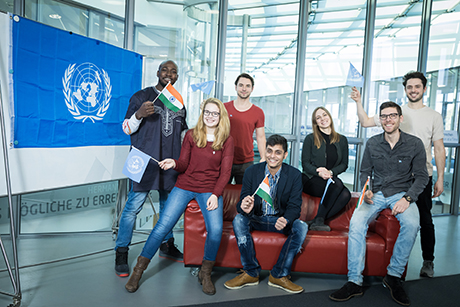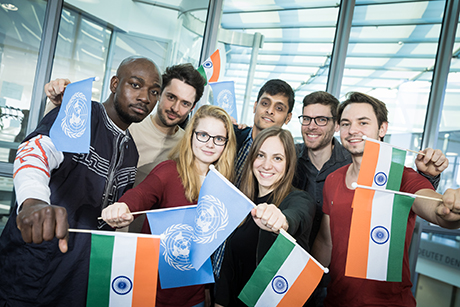How can international negotiations be conducted applying the principles of Design Thinking? A 10-member delegation of the HPI School of Design Thinking Potsdam wants to find out: From 12 to 16 March the group of young innovators is participating in the "Harvard World Model United Nations" conference in Panama City. At the world's most internationally diverse college-level Model UN conference they will represent India against 2,000 students from 100 countries.
"Design Thinking helps solving complex problems and could therefore be suited for international politics. However, the method is rarely used in this field yet. That’s exactly what we want to change", explains 28-year-old Frederik Görtelmeyer who set up the first delegation of the HPI D-School and now leads it. His fellow students are from Nigeria, India and Germany and study diverse subjects such as Biotechnology, Economics and Business Informatics. They are all connected by their Design Thinking education at HPI: "Today’s challenges disrupt both the borders of fields of study and countries, says Görtelmeyer. “We believe that Design Thinking can help you to not get lost in details but fosters collaboration and encourages to create new ideas."
The delegates face a very busy week that needs extensive preparation. "Every participant chose on specific committee in which he or she will represent India as realistic as possible", explains Görtelmeyer who represents the biggest country in South Asia at the World Health Organization. In addition to the political positions, the delegates also need to know the United Nations code of practice. The goal is to develop a resolution together over the course of five meeting days.
To finance the flight and the conference participation, the Design Thinkers organized the Design Thinking "ToolFest" in March. More than 60 participants attended workshops and talks on new Design Thinking methods. "We don’t want the discussion on a new form of politics to stop after the week in Panama. We want to share our experiences and impressions with others", Görtelmeyer adds. Therefore, the delegation already plans some more events in the summer to develop new concepts that help to answer the sociopolitical questions of our time.


